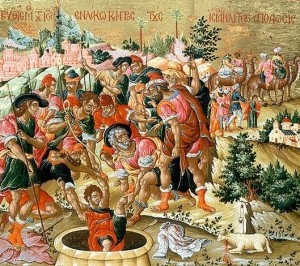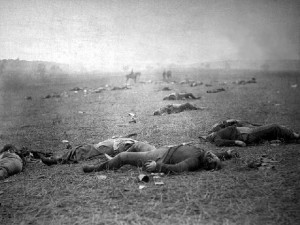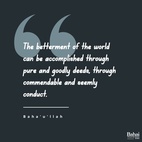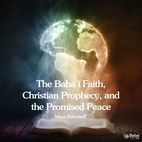The views expressed in our content reflect individual perspectives and do not represent the official views of the Baha'i Faith.
Egypt, where the story of Joseph in the Bible took place[/caption]
The Bible, The Qur’an and the Baha’i Teachings all tell the story of Joseph.
In that story Joseph’s garment, brought by his brothers to Jacob, their father, enabled Jacob to identify his beloved long-lost son – not by sight, but by fragrance. The metaphor of the fragrant “garment” is frequently used in the Bahá’í Writings to refer to the recognition of the Manifestation of God and His Revelation.

Painting depicting a scene in the life of Joseph
Of all the Biblical and the Qur’anic prophets and messengers, Joseph is distinguished by his moral and physical beauty, a major component of which is his willingness to forgive his faithless brothers their evil betrayal. In an act of world-changing tolerance, wisdom, and forbearance, Joseph summons the scattered forces of his holy lineage to become the salvation and preservation of Israel and, from the point of view of Islam, God’s very connection with the world.
The Baha’i elimination of violence, vengeance, religiously-mandated violence, and indeed hatred is a reflection of the image of Joseph and its centrality in its own particular ethos and history. Here is a Joseph who, through the exemplification of forbearance, tolerance, and long-suffering, transforms the earlier betrayal of his brothers into a spiritual event that, devoid of violence and bitterness, serves to cause the reunion and healing of the fractured family, a family which in Baha’i thought is emblematic of humanity.

Pictures such as this depicting the horrors of the Civil War
It was during the nineteenth century, perhaps with the photographed horrors of the American Civil War, that the glory associated with military might and achievement began to diminish, a process that seems to have ended in the abject brutality and carnage of World War I, the Great War. The Baha’i teachings are therefore very much in harmony with what might be thought a particular Zeitgeist: the world was becoming smaller, a new globalization was on the horizon. Baha’u’llah saw this, as is clear from his many writings on the oneness of humanity, the oneness of the world, and the oneness of religion and God.
It is also clear that these freshly articulated ideas had a history, especially in Islam, the parent religion and culture of the first three central figures of the Baha’i faith: the Bab, Baha’u’llah, and Abdu’l-Baha. It may well be that the founders of the Baha’i religion were expressing a general cultural exhaustion with such powerful spiritual incongruities, non sequiturs, and contradictions as are implied in such corrupt so-called Islamic teachings as “sacred hatred.”
The gospel of harmony, peace, and nonviolence that has so characterized the Baha’i message from its beginning until today was certainly first heard by Muslims. That this message came later to be addressed to and taken to heart by a wider constituency beyond the traditional historical, religious, and cultural borders of Islam simultaneously celebrates and laments a common humanity. It also casts a warm light on the inexhaustible spiritual resources of Islam, the parent religion of the Baha’i faith.
Since then, the Baha’is have become known worldwide as followers of a peaceful, nonviolent Faith. In a recent message to the beleaguered, oppressed and still-persecuted Baha’i community of Iran, the Universal House of Justice counseled the Baha’is with these words: “The proper response to oppression is neither to succumb in resignation nor to take on the characteristics of the oppressor. The victim of oppression can transcend it through an inner strength that shields the soul from bitterness and hatred and which sustains consistent, principled action.”
You May Also Like
Comments

















Jim Harrison
Portland, OR